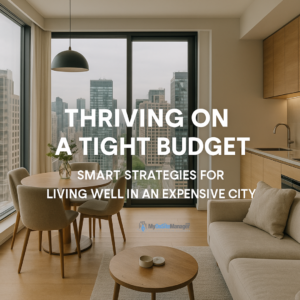Living in a high-cost city while earning a low income can feel overwhelming. Between rising rents, pricey groceries, and the social pressure to “keep up,” it’s easy to feel left behind. But as Yogesh Dahake outlines in his insightful Medium article, How to Survive on a Low Income in an Expensive City, the key lies in being intentional with your resources, reshaping your mindset, and embracing creativity in your day-to-day choices.
Here’s a deeper look into practical strategies to not just survive but thrive on a limited budget in a costly urban environment.
1. Know Where Your Money’s Going
One of the first steps to financial empowerment is understanding your spending. That means tracking every expense and sorting them into three categories:
-
Must-Pay Expenses: These are non-negotiables rent, utilities, basic groceries, transportation. Make sure these are covered first.
-
Nice-to-Have Expenses: Things like eating out, entertainment subscriptions, or buying name-brand products. You don’t have to cut these out entirely but being mindful of them can save a lot.
-
Delayable or Avoidable Expenses: Bigger purchases or things you want but don’t need immediately. Deferring these can ease pressure and give you time to save intentionally.
Budgeting apps or a simple spreadsheet can help you visualize your cash flow and adjust it in real time.
2. Redefine What ‘Luxury’ Means
Luxury doesn’t always come with a high price tag. It can mean:
-
Cooking a delicious home meal instead of spending $30 on delivery.
-
Turning your living room into a cozy movie theater with borrowed DVDs or streaming free movies.
-
Practicing yoga with free YouTube classes instead of a pricey studio membership.
When you get creative, you’ll be amazed at how many enjoyable things you can do for little to no cost.
3. Reframe Your Financial Mindset
A key takeaway from Dahake’s article is the importance of mindset. Saying “I can’t afford this” feels limiting. Replacing it with “I choose not to spend on this right now” empowers you to feel in control of your financial decisions.
This shift moves you from a scarcity mindset to one of abundance and intention. You’re no longer deprived you’re making a conscious choice to invest in your goals and long-term peace of mind.
4. Tap Into Community Resources
Cities often have hidden gems of support many of them free or subsidized:
-
Public libraries offer access to books, movies, workshops, and even coworking space.
-
Local community centers frequently host events, exercise classes, or job training at little to no cost.
-
Food banks and co-ops can help supplement groceries if your budget is tight.
-
Skill-sharing networks like time banks allow you to trade services without spending money maybe you offer tutoring in exchange for bike repairs.
Don’t hesitate to seek out and lean on these resources. They exist for a reason, and using them doesn’t make you any less independent it makes you smart.
5. Build a Supportive Social Circle
Surrounding yourself with people who understand and support your financial choices can make a huge difference. Social pressure to overspend whether it’s grabbing drinks, splitting expensive bills, or going on group trips can derail your budget quickly.
Communicate openly with friends about your goals. Suggest budget-friendly activities like potlucks, hikes, or free museum days. You might even inspire others to rethink their own habits.
6. Find Joy in Simplicity
One of the unexpected benefits of living on less is gaining clarity on what truly matters to you. Without the distractions of constant consumerism, you’re more likely to focus on meaningful experiences deep relationships, personal growth, physical wellness, and self-expression.
Ask yourself:
-
What brings me joy that doesn’t cost money?
-
What do I truly value about city life?
-
How can I align my budget with those values?
This kind of reflection not only helps your wallet, it improves your emotional and mental well-being, too.
7. Create a Buffer No Matter How Small
Saving money on a low income can feel impossible but it isn’t. Start small. Even putting aside $5 or $10 a week can create a cushion over time. Emergency funds give you peace of mind and reduce the temptation to rely on credit cards or payday loans when things get tough.
Automating small savings transfers or using micro-saving apps can make this easier than you think.
Final Thoughts
Living in an expensive city on a low income isn’t easy but it’s also not hopeless. With the right mindset, smart financial planning, and a willingness to embrace alternative lifestyles, you can carve out a stable, fulfilling, and joyful life.
As Yogesh Dahake reminds us, it’s not about how much you make it’s about how intentionally you live.

